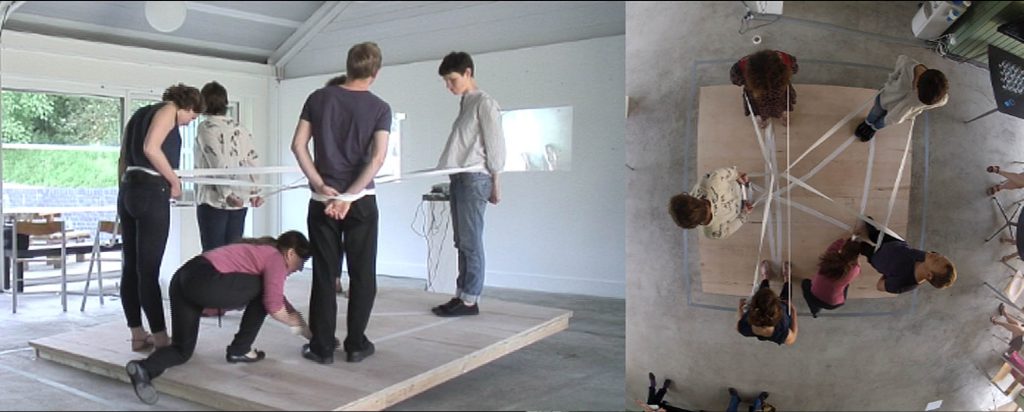Blog
Draw to Perform 3
Draw to Perform 3, London
Spa(e)cious, Elena Cologni
(live participatory performance: two live projections, wooden platform, elastic string, paper, masking tape, 2012) , video documentation of the version presented in the exhibition Wysing Arts Contemporary: Recollect, at Wysing Arts Centre, Bourn, UK
Elena Cologni was introduced by Helena Blaker, who talks about the ‘open-ended and evolutionary, unfixed and emergent quality of Cologni’s work’ (https://vimeo.com/channels/891782/49685158)
“Spa(e)cious’[i] aimed at creating the physical and psychological conditions to enhance an awareness of the illusory nature of the perception and memorization of time and space in the present. Through a strategy of spatial relations of bodies, I devised a participatory and performative activity for 5 people. This was based on the observation that the body experiences time and space while moving through, and in space, since before we learn to speak (Plumert and Spencer, 2007), in this sense we build our spatial relations with the world and others through our body first, before language develops. The piece is underpinned by elements of cognitive psychology and philosophy, in particular the Memory ‚Äď Time ‚Äď Perception relation: the definition of specious present (a present moment in which perception and memory are indistinguishable from each other, James 1890: 608); the notion of the present within duration (Bergson 1956); and, the notion of Praktognosia, experience of movement “as original and perhaps as primary‚ÄĚ (Merleau-Ponty 1962: 140). Spa(e)cious is performed through stages on a horizontally pivoted platform which interferes with our experience of the actual, and which prompts the participants to react by establishing physical and social relations in space with each other. The dynamics that took place among people on the unstable platform included: pulling each other as they are joined together with elastic string; avoiding each other as they walk on a marked path; and balancing each other, most of these happened with very few or no words exchanged. Mainly through looking, moving arms and gripping a pre-linguistic communication system was established. While restaging this work I became more interested in how the social and cognitive dynamics among the participants on the platform translated into different movements and shapes in the defined place. I then started investigating different related strategies through dialogic site specific interventions….”
extract from Elena Cologni ‘A Dialogic Approach For The Artist As an Interface in an Intercultural Society’ (2016) in Burnard, Mackinlay, Powell (Eds). The Routledge International Handbook of Intercultural Arts Research New York, London: Routledge
[i] presented at: How Performance Thinks, Conference PSi Performance and Philosophy working group and Kingston University‚Äôs practice.research.unit 2012, The London Studio Centre, London; Re-Collect, curator Ellie Morgan group show Wysing Arts Centre,¬† Bourn, UK; !KF Institut f√ľr k√ľnstlerische Forschung Berlin, Germany; Cose Cosmiche, Artra Gallery, Milan; MK Gallery, Milton Keynes, UK (2012); Lincoln University, May; PSi #19, Stanford University; Bergamo Scienza, Bergamo, Italy, with Caterina Albano; (2013); Cognitive Futures Conference, Oxford University (2015).
Biography. Elena Cologni is an artist, academic and educator, she has a PhD in Fine Art (with psychology and philosophy) from University of the Arts, London Central Saint Martins College, 2004 (CSM). Her academic positions as artist include a Post-Doctorate Fellowship at CSM (Arts and Humanities Research Council UK 2004/06), a Research Fellowship at York Saint John’s University (Arts Council of England, 2007/09). She contributes to the Commonwealth Intercultural Arts Network (University of Cambridge). She is the founder and director of Rockfluid, umbrella interdisciplinary project outcome of a residency at the University of Cambridge, Faculty of Experimental Psychology, awarded with two Grant of the Arts, Arts Council of England, and Escalator Visual Art Retreat at Wysing Arts Centre, Escalator live art, Colchester Arts Centre. This includes many international specific interventions, investigation the relationship memory, perception and place.
